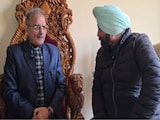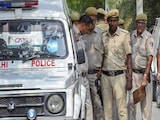Delhi Chief Minister Arvind Kejriwal is holding a high-level meeting - attended by Environment Minister Gopal Rai, Public Works Department Minister Atishi, Transport Minister Kailash Gahlot, and Health Minister Saurabh Bhardwaj - to discuss the city's worsening air pollution crisis.
The meeting comes as the national capital battles its annual air pollution crisis.
The city's air quality remains mired in the 'severe' category for a fifth consecutive day.
The overall AQI is 488 (on a scale that maxes out at 500). Within the city, some of the worst-affected areas are New Moti Bagh (488) and RK Puram (466) in South Delhi, Patparganj (471) in East Delhi and ITO (402), which is in the north-eastern part of the national capital.
The apocalypse-like pollution crisis has led the Delhi government to extend closure of all schools (till Class 5) to November 10; Class 6-12 students can opt to attend classes online, the government said.
Meanwhile, the blanket of toxic smog that continues to cloak Delhi has prompted doctors to raise concerns about the growing number of respiratory and eye ailments among children and the elderly.
Microscopic PM2.5 particles - which can lodge deep in the lungs and cause health problems - soared eight times above the government's the safe limit of 60 micrograms per cubic metre across Delhi-NCR over the last few days. That safe limit is itself 12 times more than that advocated by the World Health Organisation - which is five micrograms per cubic metre.
The centre has put the Graded Response Action Plan (GRAP) into effect at its highest level in Delhi and surrounding cities, where the air quality has remained in the "severe plus" category.
The Graded Response Action Plan (GRAP) is a set of anti-air pollution measures that the Central Pollution Control Board (CPCB) has established. The GRAP has four stages, with Stage IV being the most severe. Stage IV is activated when the Air Quality Index (AQI) remains above 450, or in the "severe plus" category.
To combat severe air pollution, the GRAP prohibits trucks from entering Delhi, except for those carrying essential goods, providing essential services, or powered by LNG, CNG, or electricity. Only electric, CNG, and BS-VI diesel light commercial vehicles (LCVs) registered outside of Delhi are allowed to enter the city, except for those carrying essential goods or providing essential services.
All construction and demolition work in Delhi has been suspended, including public projects such as roads, bridges, and power lines.
The Delhi and central governments may allow public, municipal, and private offices to operate with half of their staff working from home.
Delhi's air quality is one of the worst among capital cities globally, with a University of Chicago report finding that air pollution reduces life expectancy by almost 12 years.
NDTV is now available on WhatsApp channels. Click on the link to get all the latest updates from NDTV on your chat.















